Highlights - September 2024
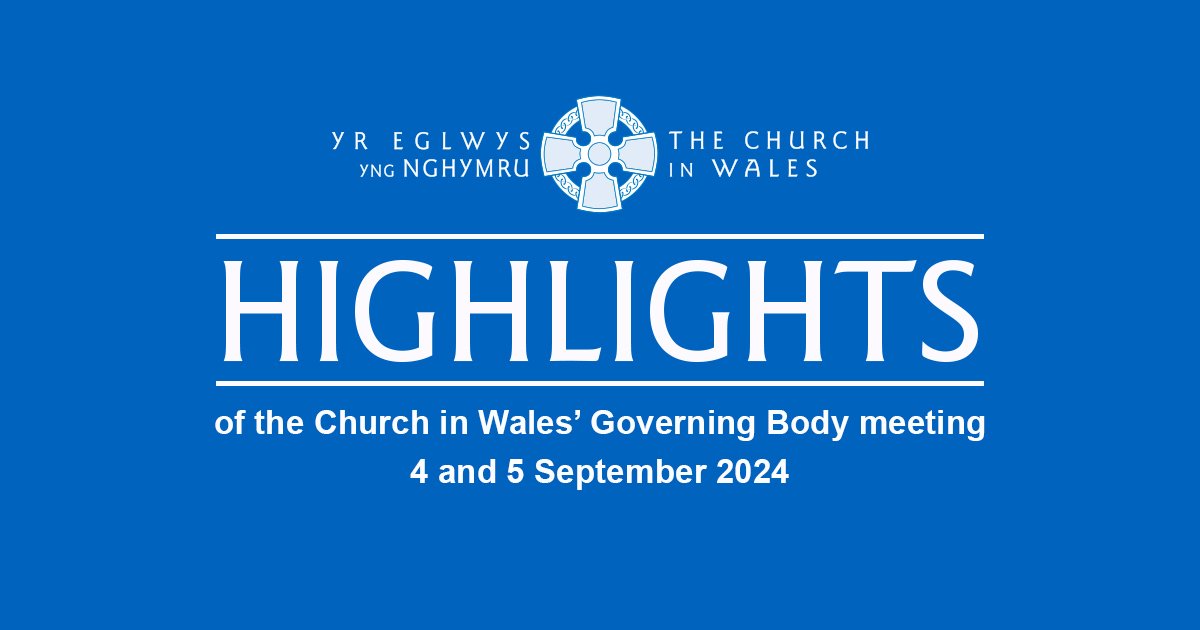
Members of the Church in Wales’ Governing Body met at the University of Wales Trinity Saint David on September 4-5. The meeting was live-streamed and you can read the summary and watch each session below.
Worship
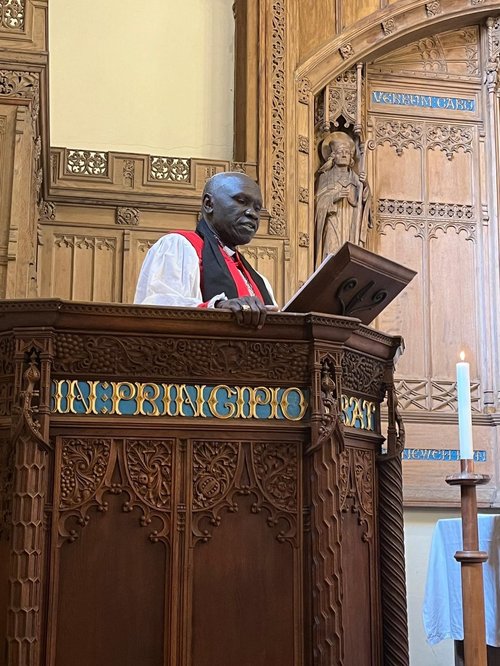
The Archbishop presided at the opening Eucharist at the University Chapel of St David and Bishop Anthony Poggo preached (pictured). Evening prayer, also at the chapel, was led by Canon Hannah Rowan and the Revd James Henley preached. Bible study in the arts hall on the second morning was led by the Archdeacon of St Davids, Paul Mackness. All the worship was co-ordinated by the Archbishop’s Chaplain, the Revd James Tout.
A collection was taken for the charity National Energy Action, which supports those struggling to stay warm and safe at home.
Daily Sessions
- Welcome to visitors
- Presidential Address
- Bench of Bishops' report
- Advent Course launch
- Questions and Answers
- Clergy Terms of Service
- Standing Committee Report
- Governance and Legal matters report
- Report from UWTSD
- Evening Prayer
- Open Doors UK presentation
- Representative Body report
- Address from the Secretary General of the Anglican Communion
- Imprisonment for public protection sentences
- Governing Body meetings discussion
- Farewells
- Date of next meeting
Session One
Welcome to visitors
The Archbishop welcomed representatives from other churches and organisations. These were:
- Cytûn & the Covenanted Churches in Wales: Dr Cynan Llwyd, General Secretary
- The Anglican Communion: Bishop Anthony Poggo, Secretary General
- The Church of England: The Revd Jon Carter (Diocese of London)
- United Reformed Church of Wales: The Revd Martin Spain, Ecumenical and Interfaith Officer
- Methodist Church: Canon Dr Jennie Hurd, District Chair, Wales
- Union of Welsh Independents: The Revd Jeff Williams, President
- Presbyterian of Wales: The Revd Aneurin Owen, Moderator
- United Society Partners in the Gospel: Carol Miller, Church Engagement Manager
- Christian Aid Cymru: Mari McNeill, Head, Rebecca Elliott, Education and Youth Officer, Wales
Presidential address
Archbishop Andrew John noted how the recent Paris Olympics and Paralympics had shone a spotlight on a new team made up of refugees; people “in search of a place where he could build a future without bombs and violence”. Each of the refugees had spoken of their thanks to the others who had helped them on their journeys, highlighting the famous African proverb: “If you want to go fast, go alone. If you want to go far, go together.”
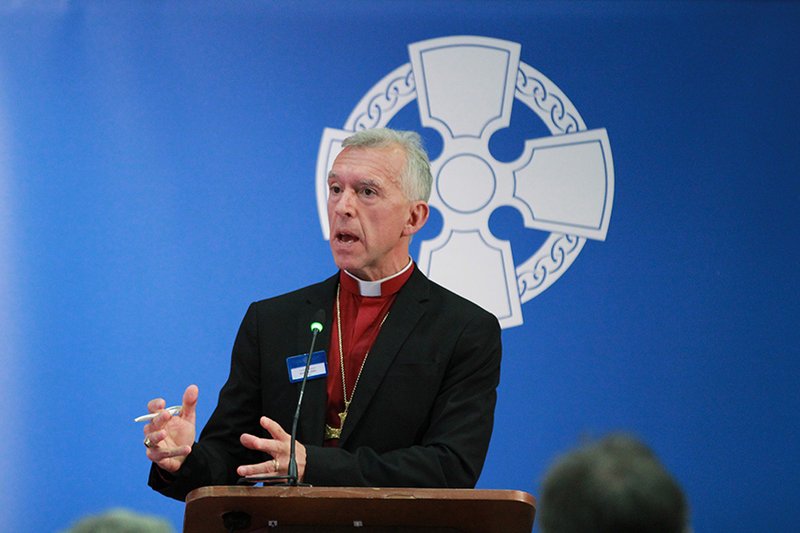
The Church in Wales’s relationship with the Anglican Communion was just one example of this abiding truth: “Better, together”. But the things which brought people together could not be taken for granted in our “fragile” world, Archbishop John said. He then introduced the famous passage from 1 Kings about Elijah meeting God not in a fire, wind or earthquake, but in a gentle whisper. God twice asks the prophet, wrapped up in his battles with enemies: “What are you doing here?” Later this year the Church will gather as a Learning Community across dioceses to ask the same question, to reflect and build.
Now that all dioceses had reorganised themselves into ministry areas, all had a renewed focus on sharing resources and “a common commitment to a distinct area, to build teams which include the gifts of all God’s people and to look outwards because God loved the world so much”.
God had already begun rebuilding a new Church, very different to the one into which most members had been baptised, Archbishop John said. “But it is a church which is better placed and shaped more creatively to reach out in loving service and in Christ Jesus.” One example of this from his own diocese was an outdoor chaplain in the Eryri (Snowdonia) national park, tasked with ministering to the thousands of tourists and visitors each year; looking for ways in which God was already at work and building relationships to join in.
“This blend of distinctive pioneering work alongside our commitment to ministry areas provides a new and exciting way of seeing our tasks as a church,” he said. “Better, together.”
We have always been at our very best when we are courageous, and together.
Another key part of the picture was the hope generated by the Church Growth Fund. Ambitious but thoughtful bids for funding were coming in regularly, demonstrating many across the Church remained “energised in the task of sharing good news”. The bids had to be incarnational, Archbishop John added – rising up from what was actually happening in the dioceses. They also had to be stretching, forcing the Church to feel the “discomfort” of trying new things and breaking new ground. Just like Elijah, forced out of his comfort zone and relying on ravens for food in the wilderness; this is where blessing comes. “We have always been at our very best when we are courageous, and together.”
He also hailed the Restoring Welsh Rivers summit being hosted by the Church in Wales in November. This has involved 18 months of preparation and will bring 70 delegates from across the UK. This would be one of the largest ever gatherings of its kind, with representatives from academia, farmers, the water industry and others. This issue of rivers was complex and contested, but the Church was committed to keeping the conversation going even if agreement was not possible.
New resources and schemes such as “adopt a river” would be launched afterwards, underlining the Church’s commitment to Wales.
When it came to the Anglican Communion, most attention was paid to disagreements over sexuality and same-sex relationships. These were, of course, important, but doing this theology together was also vital. Jesus’s prayer that the Church would be one was not a vague aspiration but a statement of reality. “In other words, his prayer was that we might inhabit the truth and constantly discover the joy of being one body.” If the Communion could reunite around mission and social justice, it could relearn that being in communion is simply about “belonging to each other in Jesus and doing his work”.
He recently met some Anglicans from Kyiv, Archbishop John told members. In the midst of the tragedy of war, they had discovered what it meant to live faithfully, despite the danger. The conflict had helped these Christians return to the basic, simple task of putting our trust constantly in God. “It will only be possible for us to witness to these places like Gaza and Ukraine, if we do it together.”
God sent beleaguered Elijah back to do the same thing he had already been doing. But the prophet had been changed by his meeting with God, rejuvenated and reorientated. The question asked of him still stands for the Church in Wales: “What are we doing? Like him, will you heed his voice and go to it? Together, better and with joyful confidence, attend to the work of God to make Christ known?”
In questions following the address, Dr Barney Hawthorne (Llandaff) said he was surprised there was no specific item on the agenda about the Church Growth Fund and asked if there could be a standing discussion on this at every Governing Body. Knowing more detail on applications, including what worked and what had been rejected, could help every level of the Church get things right.
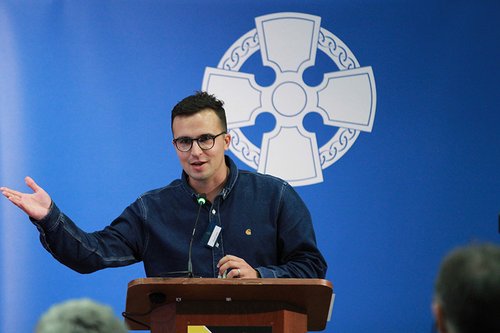
Elizabeth Crawford (Monmouth) asked about the rivers summit and in particular what the longer-term timeline for it was beyond the meeting in autumn.
Dr Cynan Llwyd, general secretary of Cytûn (pictured), highlighted the importance of building bridges, not dams, in a crisis and invited people to use Cytûn as a bridge to bring people together.
In response, Archbishop John said in relation to the Church Growth Fund there would be a new appointment to replace the evangelism director who had stepped down. He agreed it was important that feedback from the Fund and its operation was circulated around the Church, and said this would be a focus at the Learning Community. This was not just an exercise in information exchange, as “discernment and wisdom sit within the whole body of Christ” and so the Church could not grow without hearing from everyone, especially those at the margins.
In relation to the rivers summit, a steering group was overseeing the process and the programme, he also said. They were also sponsoring the post-summit work, which would include a Charter for Wales, including a call to ban wet wipes (the single biggest cause of sewage blockages). “There could be some real sparks and fireworks at the summit, because we are bringing together people with very different agendas. There is real tension here,” said the Archbishop.
The Representative Body had funded the whole summit in a mark of serious generosity and this was making a significant impact beyond the Church, but he suspected not much money would be required beyond the first year of the project.
When it came to ecumenism, Archbishop John said what excited him was learning from what other churches were doing informally, whether that was around deploying pioneer ministers or the Roman Catholic Church’s synods on synodality. A forum to learn productively together between denominations had perhaps not yet been found, he conceded, but “this was the pearl of great price”.
Report from the Bench of Bishops
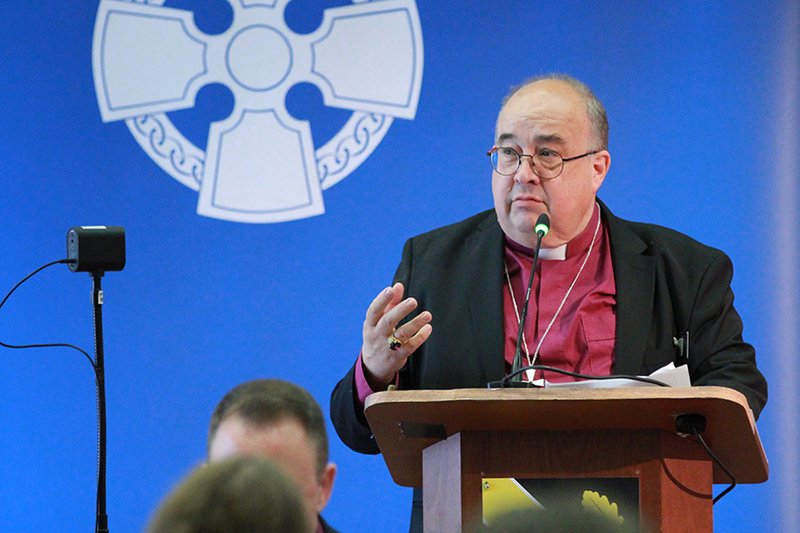
The report was introduced by the Bishop of St Davids, Dorrien Davies, who explained the Bench had met three times since the last meeting of the Governing Body. He said a meeting with other Celtic bishops in Ireland had been hugely enjoyable and profitable for the bench. Bishop Davies highlighted the work the bishops had done around the Church’s Priorities, which were grounded on what all Christians believed.
A new candidates panel would be set up, as an extension of the provincial discernment panel, to advise the bishops on issues arising from ordination candidates who wanted to transfer their training pathway, or others wishing to transfer from other Churches into Wales.
The Church continued to play its active role in the life of the Anglican Communion and had contributed its thoughts to international liturgical consultations.
Bishop Dorrien assured the Governing Body that despite the inevitable administrative burdens on the bishops, all their work was always “Spirit-led and centred on the gospel we all are privileged to profess”. The bench was united, and hugely valued the diversity of the Church in Wales.
Opening questions, the Archdeacon of the Gwent Valleys, Stella Bailey (Monmouth), asked if the report Walking in Integrity would be published.
Bishop Davies said it would.
Tony Mullins (Llandaff) said with ministry areas now established in every diocese, there remained much hurt and pain in churches which had been closed or about to close. It felt like “the emperor’s new clothes” as there was lots of talk about ministry areas but not much to see yet, and there remained a lot of work about helping people through this “painful change”? What part of evangelism and church growth would address this?
The Bishop of Swansea and Brecon, John Lomas, said in response that he shared the pain Mr Mullins spoke of, having been a parish priest and ministry area leader before. Exciting things were happening in each diocese, but there needed more joined-up thinking he admitted, especially by the evangelism groups across the province. There were tools that could be used to “take away some of the fear around evangelism”, and which would help unite people together across very different churches, he said.
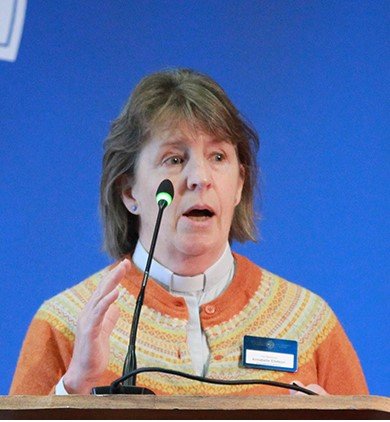
The Revd Annabel Elletson (Swansea and Brecon) said she had not seen in the report any mention of ministry with older people, and asked if one bishop could be tasked with overseeing this important area. It was a growing part of the Church’s ministry and also had overflowing impacts on the family members of the elderly too.
The Bishop of Bardsey, David Morris, said this would fall within his brief under the chaplaincy heading and agreed it was very important.
Session Two
Launch of Advent Course 2024
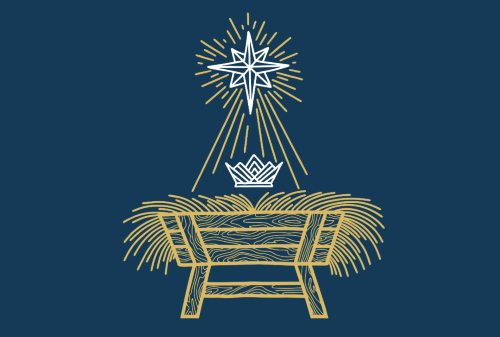
The Advent course was introduced by the Bishop of St Asaph, Gregory Cameron, who said many in the Church in Wales had been calling for more active teaching ministry from the Bishops. Archbishop Andrew had challenged the bishops to write an Advent course, which had resulted in O Come Let Us Adore Him. This was something every church in Wales could use in the coming months. It amounted to a series of Bible studies, one written by each bishop. Members were then invited to take part in the introductory session to the course on their tables, prompted by a video led by the Archbishop. Afterwards, Bishop Gregory urged members to take the course into their parishes and suggested church members do their own Bible studies week by week ahead of the Sundays. “Spend Advent with your bishops – nothing could be finer!”
You can join in the Advent course and download resources here
Questions and Answers
Question One
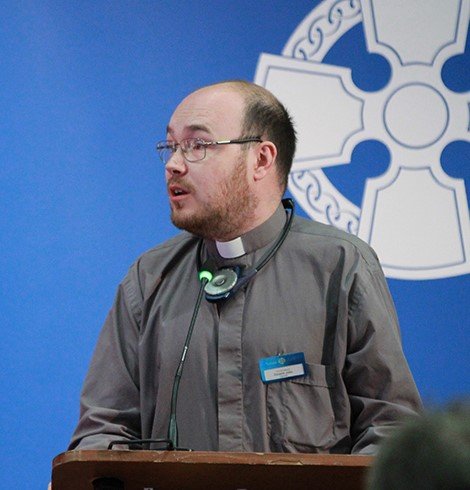
The first question was from the Revd Geraint John (Llandaff) who recalled how in 2022 the Bench of Bishops had welcomed the Welsh Government’s plan to ban conversion therapy. He wanted to know what had been done since then to ensure no conversion therapy was happening in the Church in Wales and could the bishops take steps before a legislative ban came in to ban it themselves. This should include defining such therapy in a Christian context, affirming that gender dysphoria and same-sex attraction were not sinful and did not need healing, asking the Welsh Government not to create any religious exemptions in their legislation, and disciplining anyone in the Church carrying out such therapy.
Answer
Bishop Gregory responded by noting the bench had first published its rejection of conversion therapy in 2021, in response to the UK government’s consultation on its own ban. Gay conversion therapy was “abusive and traumatising”, Bishop Gregory said, and “has no place in the modern world”. After clarification was requested from the Evangelical Fellowship of the Church in Wales, the bishops reiterated that “any therapy which purports to change someone’s sexuality was in our opinion abusive and should be banned”. The Church’s role was to offer “welcome, acceptance and friendship”, and – if requested – prayer for God’s grace, guidance and blessing without a defined outcome. The Bench was currently working on spiritual abuse within the Church, and conversion therapy falls within the remit of this project, Bishop Gregory said. The Church’s position on sexuality was also being reconsidered and a 2002 statement would shortly be updated, although the outcome of this could not yet be fully prejudged. But Bishop Cameron said Mr John should be “reassured that all four of his questions were broadly consonant with the direction of this work”. He said the Welsh Government had paused its own legislative work in order to collaborate with the Westminster government’s own plans to ban conversion therapy, which the bishops supported.
Mr John said he was encouraged by the bishop’s answers and the Bench’s ongoing commitment to protect LGBTQ+ people in the Church.
Question Two
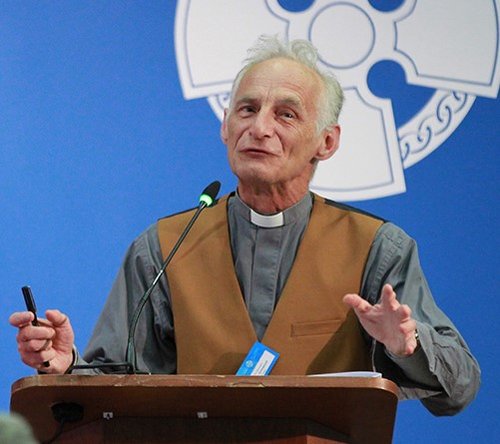
The second question was from the Archdeacon of St Asaph, Andy Grimwood (St Asaph), and asked the Representative Body to update the GB with figures showing the total cost of all posts paid more than £60,000 a year since 2014.
Answer
Responding, Professor Medwin Hughes, the chair of the RB, said the RB employed a range of people with different specialisms, from accountants to IT specialists to safeguarding experts. Salary levels were benchmarked against comparable roles in the South Wales region. The number of people paid more than £60,000 had more than doubled in the last decade, but this should be placed against a rise of 43.7% rise in average UK wages. A salary of £60,000 in 2014 was equivalent to more than £85,000 this year. Five people were paid more than £60,000 in 2014, and today those paid more than £85,000 was seven.
Some salaries significantly under the threshold in 2014 had now crept over it thanks to inflation. In some years there were also a double headcount, when senior staff leaving overlapped for a short time with their replacements for a handover period, meaning there are two salaries on the payroll. This could also artificially inflate the headcount. In only one year were additional roles created above £60,000 after a 2023 restructuring.
He said the RB trustees understood reasonable pay was necessary to recruit good staff in a robust job market, and he believed the Church got “outstanding value for the money we pay”. If a diocese was under pressure and struggling with recruitment it could, of course, be frustrating to see RB spending, Professor Hughes acknowledged. But the trustees of the RB were themselves mostly nominated by the dioceses, after all. And much of the RB’s spending was on managing risk which the dioceses could not individually tackle themselves. Some administrative and compliance tasks could also be delivered by the RB centrally on behalf of the dioceses, which had led to increased spending, but in the long-run saved the Church money overall. “The only purpose of an RB is to serve, and sometimes to serve we have to invest,” Professor Hughes concluded.
Archdeacon Grimwood thanked Professor Hughes for his answer, but asked if the time had come for a review of all lay salaries at provincial level and if so how could such a review be conducted (and could the GB have any role).
Professor Hughes said this would be considered initially by the HR committee of the RB and said he would come back to Archdeacon Grimwood with more detail later.
Question Three
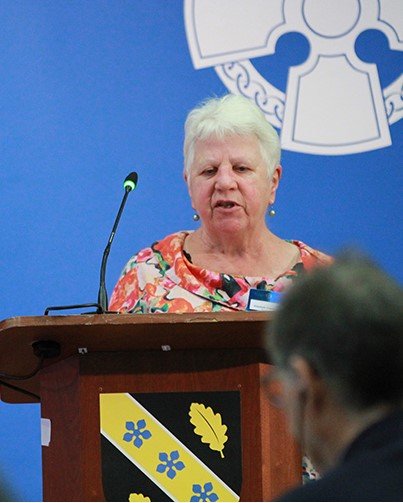
Elizabeth Crawford (Monmouth) asked what the timetable was for updating the Constitution of the Church in Wales to ensure it was still fit for purpose.
Answer
Tim Llewelyn, the chair of the Standing Committee, said in response the text of the constitution had constantly been updated and amended by the GB since it was first introduced at disestablishment. A full rewriting would take up huge amounts of GB and RB time, and require staffing resources beyond the RB’s capacity. There were no plans to undertake such a project, he said, but any member of GB was welcome to propose more piecemeal amendments to the Standing Committee.
Ms Crawford thanked Mr Llewelyn for his response and said her particular concern was about the inclusion of the words “ministry area” in the Constitution. “When will the standing committee’s work on including these words be finished/”, she asked.
Mr Llewelyn said he would have to check when that work will be complete.
Question Four
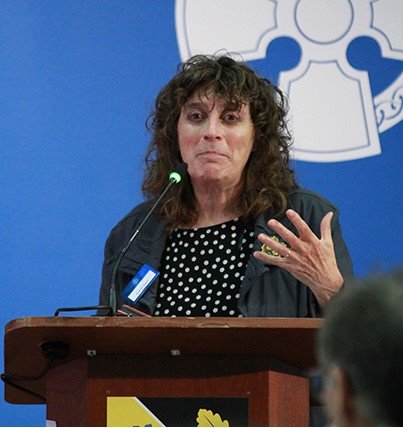
The final question came from Dr Heather Payne (Llandaff), who asked the Bishop of Llandaff, Mary Stallard, to update the GB on what work the Church was undertaking to implement the Lambeth Call on Faith and Science.
Answer
In response, Bishop Mary praised Dr Payne’s advocacy within the Anglican Communion for science and faith, especially in setting up an Anglican healthcare network in 2021. The calls, networks and commissions of the Communion must always be rooted in local communities and not simply be top-down initiatives, she said. The Lambeth Conference in 2022 had issued a strong call for Anglicans everywhere to bring science and faith into conversation, especially given the rapid advance of scientific developments in everything from vaccines to AI.
The Lambeth Call was followed up by informational webinars this year, prompting provinces to develop plans in how to deepen faith through our God-given scientific knowledge. Lead science bishops were engaged in wide consultation with their communities to hear how they could serve the existing church and reach out to those beyond. The Church in Wales had already made a start on this in measuring and reducing carbon emissions, and by hosting the upcoming summit on rivers. She also mentioned the Clewer Initiative, using data to address modern slavery, and the use of technology for mission and ministry in a number of parishes. A network of scientists and theologians was also being formed to share expertise, Bishop Mary told members.
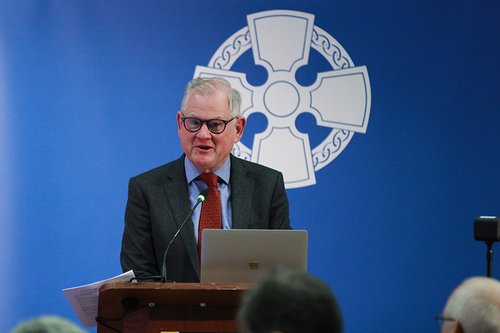
The Provincial Secretary, Canon Simon Lloyd, pictured, then offered a further response to an earlier question after Archbishop John’s address regarding the Church Growth Fund. He told members the £100m of the Fund would be dispersed in two tiers, one for bids up to £10,000, and a second for bids between £10,000 to £5m. The committee has so far approved two tier one grants, and there were nine further bids to be considered in the coming weeks. Three tier two projects had been approved so far, including two grants totalling £5.6m in St Asaph and a third amounting to £1.3m in Monmouth. The committee had a fourth second tier bid from Swansea, worth £2.8m to consider shortly. In total, that would be about £10m approved from the Fund, he said. There was a lot more in preparation from the dioceses to come, he added.
Clergy Terms of Service
The GB then turned to a private members’ motion introduced at April’s meeting, which proposed adding to the standard Clergy Terms of Service a work-free 48-hour period once a month, in addition to the 24 hours taken off every week. It would also increase the holiday to be taken after Christmas and Easter to seven days, from six at present. Before the motion could be fully debated, and several amendments considered, the debate was cut short by a procedural mechanism so that any unintended consequences be considered more deeply.
Since April, the HR committee of the RB had met and was supportive of the motion and a proposed amendment which would extend the same provision to non-stipendiary clergy.
A revised terms of service which reflected these proposals had been drafted, and also been signed off by the RB and the Standing Committee, Tim Llewelyn, chair of the Standing Committee, told members.
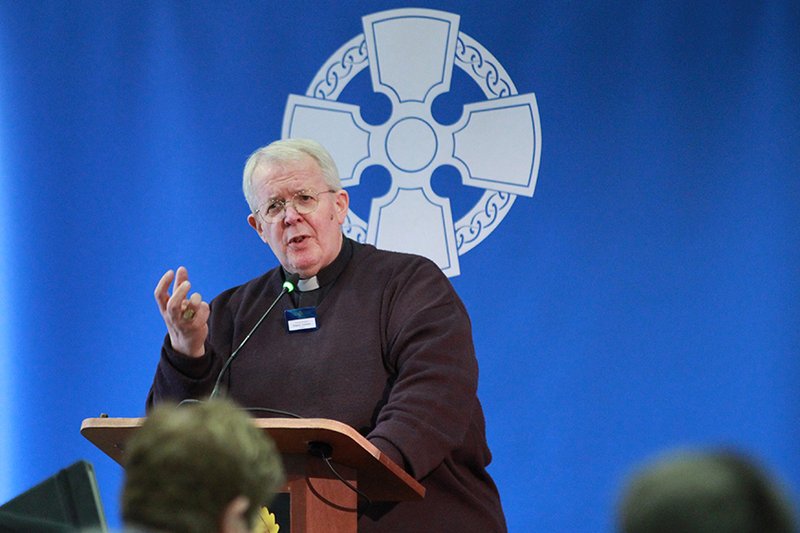
The motion was then seconded by Bishop Gregory (pictured), who said the revised terms of service addressed all the concerns and questions raised in April’s debate. The Bench and the various committees all wanted to be as generous as possible: “We really do want the clergy of Wales to know that the hierarchy of the Church is on your side and want you to flourish.” But they were also cautious about being too prescriptive, as clergy were officeholders and not employees, and if the terms of service became too detailed the law may begin to believe clergy were employees. The guidelines should also be “collegial”, framed around shared ministry teams and not “sole saviours”. Non-stipendiary clerics should not be expected to simply pick up the work of paid priests when they were off work. And finally, clergy should be given the freedom to take responsibility for their own wellbeing and not have to rely on archdeacons or bishops to manage their working hours healthily.
The Revd Richard Mulcahy (Monmouth) welcomed the new proposals, although he did not think they went far enough. He was not sure the balance of responsibility between clergy and bishops in managing their working hours had quite been struck correctly but was happy to proceed for now.
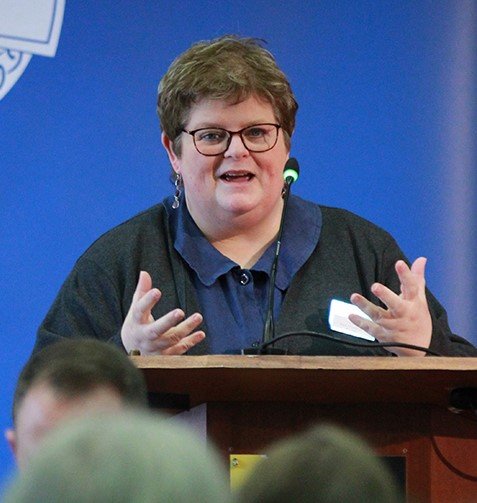
The Revd Kate O’Sullivan (Monmouth), pictured, who proposed the original motion in April, thanked the bishops and committees for taking the idea seriously and not simply kicking it into the long grass. She said it was a step forward, noting that curates and junior clergy on teams lacked the freedom priests were perceived to have to control their own diaries.
Archdeacon Andy Grimwood asked if there was a way for archdeacons to enforce this, saying he was aware of clergy who did not take their leave and some who also abused the process, and he wanted the ability to tackle both of these.
The Dean of Newport, Ian Black, said ministry was a marathon not a sprint and said the reworked terms of service were very welcome in enabling clergy to run the race to the end. While it was true that clergy should look after their own hours, there was also a responsibility to keep an eye on each other and it was important to beware of structural pressures which made it hard for clergy to switch off.
The Revd Adam Pawley (St Asaph) praised the balance struck by the new terms of service.
The Revd Kevin Ellis (Bangor) said it was good clergy were being entrusted with managing their own diaries and fully supported the new terms.
Moira Randall (Llandaff) said congregations also had a duty of care to the clergy who served them, and should ensure they did not fail to take their time off.
Canon Rosie Diamond (Bangor) supported the proposals, but said in some circumstances it might not be possible to find a replacement cleric to hold a service of Holy Communion and could this be reflected in the new terms.
The proposal was then put to the vote and passed unanimously.
Session Three
Standing Committee report
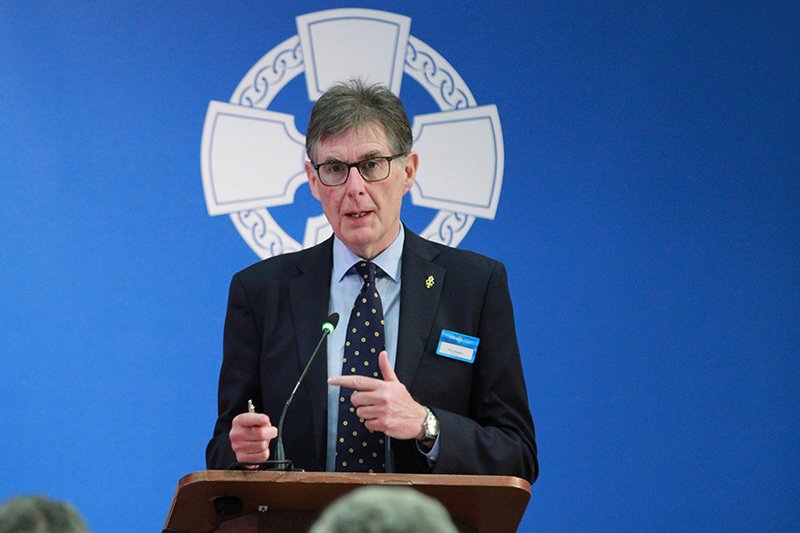
The Chair of the Standing Committee, Tim Llewelyn, pictured, presented the report. He said a motion to abolish the upper age limit on standing for election to the GB had been intended to be brought to April’s meeting, but this had not happened in the end as the member behind it could not attend. The standing committee instead believed abolition of age limits could have “unintended consequences” and so preferred to let them stand for now, although any member of the GB could bring a debate again if they wished.
The Revd Kevin Ellis (Bangor) noted that the planned dates in 2028 would clash with Easter week, when according to the recently revised terms of service many clergy should be on holiday.
The Revd Ruth Rowan (Monmouth) noted a line in the report which said self-evaluation forms would be sent out to ministry areas, and asked for clarity what this meant.
The Revd Richard Mulcahy (Monmouth) asked if it was premature to set dates until 2030 when a debate this meeting was due to consider reforms of how the GB met. He also asked if the carbon footprint of gathering members from across Wales had been assessed.
Mr Llewelyn said the 2028 dates would be reassessed given the clash with Easter. On the issue of remote meetings, the committee believed huge benefits came from physically meeting together, including the fellowship beyond the formal sessions of the GB.
The standing committee’s proposed new dates for meetings of the GB up to 2030 were then voted through, apart from the April 2028 dates which were withdrawn for further consideration. The wider report was also voted to be accepted.
The following day, the secretariat brought revised April 2028 dates, (April 26-27) to the GB, so they no longer clashed with Easter, which were nodded through by members.
Governance and legal matters report
Mr Llewelyn introduced the Standing Committee’s governance and legal report. The first recommendation invited the GB to endorse the Standing Committee’s belief that the Church in Wales should continue to utilise an exemption from governmental regulations on listed buildings. This would require it to have an internal system of controls on changes to its hundreds of listed church buildings, namely a robust faculty process. A review of the faculty system had reported back and concluded the system should be retained, he explained.
Bob Evans (Monmouth) said he strongly supported this recommendation, noting how the Church’s exemption enabled them to balance the needs of protecting heritage with ministry needs. Only the Church could balance these issues, not the civil listed buildings consent process, he insisted. The Church could also take a long-term view of its property, which was hard for the civil process.
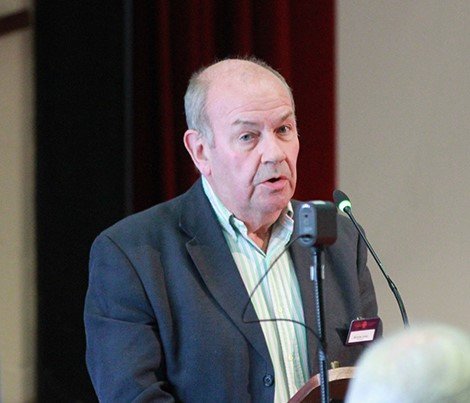
Nicholas Cooke KC (Monmouth), pictured, strongly supported retaining the faculty system, noting the mission of the Church would never be considered by the secular parallel process. It would also be much more expensive to dispense with the faculty process, given chancellors and diocesan advisory committees offer their services free of charge.
The Revd Richard Mulcahy (Monmouth) reminded members the faculty process covered all churches, not just the listed ones. He asked if the faculty system could have a ‘lighter touch’ for more modern buildings which would have no problem in the secular process having major changes made.
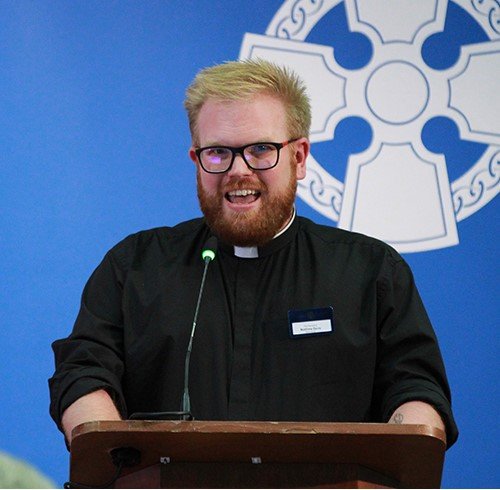
The Revd Matt Davis (Monmouth), pictured, was also in support of retaining the faculty system. He said churches in poorer areas, such as his own, struggled to secure the professional advice and work needed to get through the faculty process, as there was a lack of skilled locals who could help. “I believe the faculty system is the right way to go, but there needs to be support put in place because it cripples in some places.”
Alex Glanville, the Church’s Director of Property Strategy, said the initial review had been on the existence of the faculty and the ecclesiastical exemption, but once that had been settled then the next phase would begin – exploring how the faculty system could be improved. There would be a wide-ranging consultation for churches and dioceses to make their views known, and then recommendations would be brought back to GB next September.
The GB voted to approve the first recommendation from the report.
Mr Llewelyn then introduced the second recommendation, which was a minor technical amendment to the constitution regarding Newport Cathedral. It was swiftly passed.
The third item was then introduced by Mr Llewelyn for approval of the whole report from the Standing Committee on legal and governance matters.
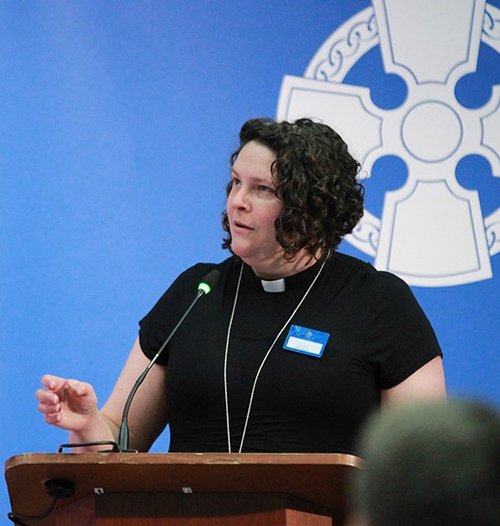
The Revd Ruth Rowan (Monmouth), pictured, commented that the majority of children were not born on their due date, and so most fathers did not know when they would need to take their short period of paternity leave. She questioned the policy which said 28 days’ notice was necessary to provide notice of paternity leave.
The Revd Adam Pawley (St Asaph) asked what provision for paternity existed for ordinands, and also raised questions about whether clergy could take paternity leave following a stillbirth (as the law provides for).
The Archdeacon of Wrexham, Hayley Matthews (St Asaph), suggested using the language of parental leave and primary and secondary parent, rather than maternity leave or paternity leave.
Responding to the debate, Mr Llewelyn said following a discussion over the coffee break, it was decided to withdraw the paternity policy entirely for more discussion with the HR committee, in response to some drafting and other concerns raised by members. He proposed that GB accept the report apart from the paragraphs related to the paternity policy.
This was voted through.
Report from University of Wales, Trinity Saint David
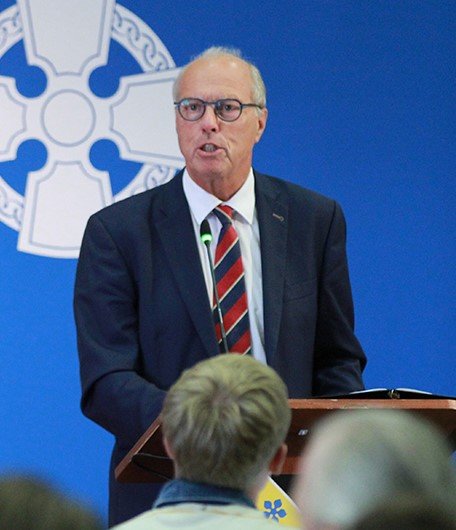
Gwilym Dyfri Jones, the provost of the University of Wales, Trinity Saint David’s Lampeter and Carmarthen campuses, then introduced the university’s report. He said a large part of the university’s success came from its partnerships, including its long-standing relationship with St Padarn’s, which continues to thrive and grow. In the past year, the university has set up a new apprenticeship in workplace mission and ministry, which had welcomed nine full-time students for its first year. This qualification worked with a number of denominations across Wales, “providing a means of recognising leadership in churches”. A recent review of St Padarn’s provision recognised it as high quality in academic terms and in its support of students.
Theological research was thriving across both campuses, Mr Dyfri Jones reported, including international collaboration, and a new Anglican chaplain had been recently appointed. He also said there was an opportunity for the university’s Welsh language centre to work with the Church in furthering its own push into bilingualism.
The Bishop of St Davids, Dorrien Davies, told members his diocese was immensely proud of its association with the university.
Session Four
Evening Prayer
Session Five
Open Doors UK
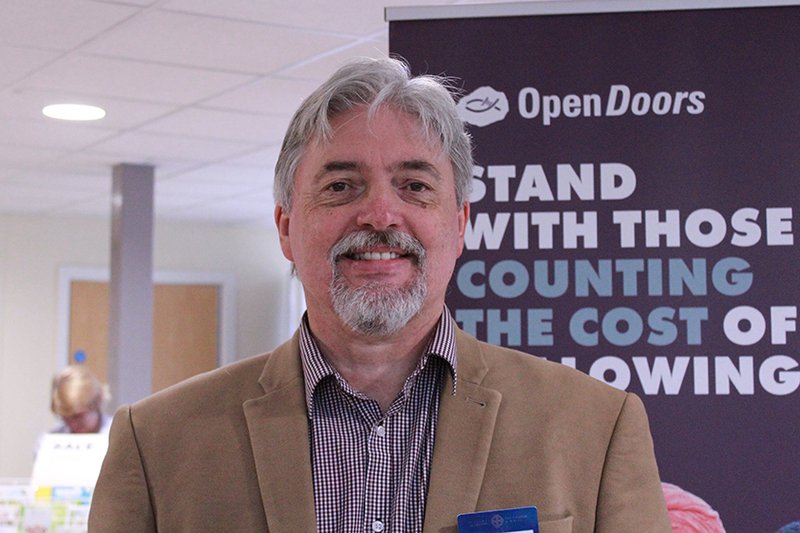
Jim Stewart, pictured, Wales church relations manager at Open Doors UK, began his presentation introducing the work of the persecuted church advocacy group. Every January, Open Doors produces its World Watch List, highlighting the top 50 countries in the world where it is hardest to be a Christian, which many believers use to fire their prayers. One in seven Christians globally face persecution or discrimination, Open Doors reports. The other six must pray and support their brothers and sisters counting the cost of following Christ, Mr Stewart said. Persecution can range from bullying, harassment, abuse, violence, imprisonment and all the way up to death. In some countries pressure on Christians amounts to less aggressive but still insidious legal discrimination and efforts to squeeze believers out of public life.
But despite this, the persecuted church in many nations continues to stand up for Jesus, Mr Stewart said, citing one example in the Democratic Republic of the Congo where a church which suffered a bombing attack re-opened a year later, uncowed, with a full weekend of public services. A Malaysian pastor who was snatched off the street in 2017 by the security services had pre-emptively been memorising Scripture, his wife told Open Doors. His wife had initially been traumatised and suffered panic attacks and anxiety after her husband disappeared, but has since found peace and encouragement through retreat and Bible study, Mr Stewart said.
The story of Shadrach, Mesach and Abednego in the book of Daniel had been an inspiration to Open Doors’ work this year, he explained. In that story the three Hebrew men drew a “line in the sand” and refused to worship the golden statue. Likewise, one young Christian woman – Leah Sharibu – who was abducted by Islamist militants in Northern Nigeria remains in captivity years later unlike all her friends who were released because she alone refuses to convert to Islam – also drawing a line in the sand.
In Saudi Arabia Christians in secret churches only have Bible apps on their phones rather than physical copies, as apps are easy to delete should their gatherings be raided, Mr Stewart said. He also led members in prayers for the secret church in Afghanistan in particular.
Mr Stewart said Open Doors’ ultimate prayer was that all persecuted believers would stay close to Christ, and closed by leading members in singing the hymn “Take the name of Jesus with you”.
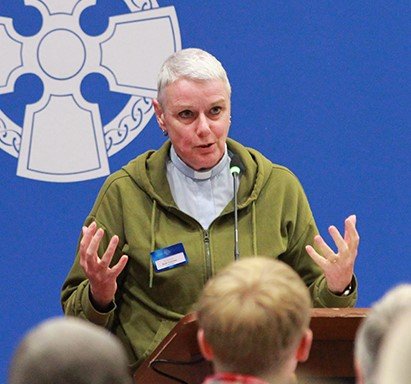
The Revd Ruth Coombs (Llandaff), pictured, praised Open Doors, saying every church in her ministry area had a copy of their literature available and soon they would begin praying once a month for each country in the top 10 of the World Watch List.
The Revd Mark Thomas (Swansea and Brecon) said he had been encouraged hearing the stories of faithfulness of Christians from around the world, and was keen to raise awareness of the persecuted church in his own congregation. He asked if there were specific resources available for younger Christians to help them pray.
Mr Stewart said Open Doors did produce family resources such as prayer passports to pray for specific countries, which could engage children.
The Revd Emma Dale (St Asaph) asked if Welsh churches could be twinned with a specific persecuted congregation overseas, to build closer ties and pray more concretely.
Mr Stewart said Open Doors did offer church leaders the opportunities to join quarterly webinars and access other resources direct from overseas Christians, beyond what was publicly available.
Report of the Representative Body
Professor Medwin Hughes, chair of the Representative Body, introduced the annual report and accounts from the RB. He was pleased to report the RB had received an unqualified audit report from their external auditors, while the common investment fund had gained £46m. Almost all the RB’s income was generated by its investments, and this income had increased by £1.6m in 2023.
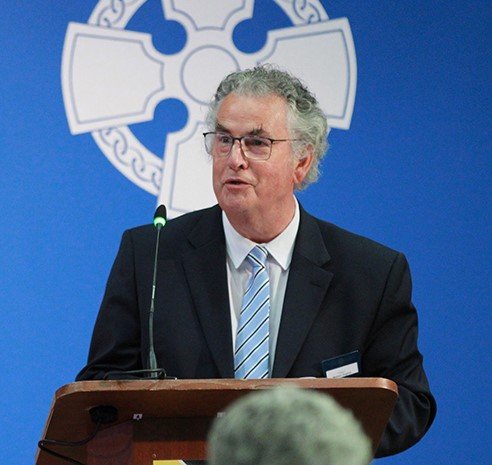
The RB also covered costs of the bishops, and in total 30% of the Church in Wales’s total expenditure was covered by the RB. He also praised the various funding streams the RB organised, including the new Church Growth Fund which was an “exciting” addition to the Church. “The RB exists for one purpose – it is there to serve to support and resource the dioceses and ministry areas of the Church,” Professor Hughes reminded members. “To be a steward for its resources and to enable the proclamation of the Gospel.”
After no debate, members of the GB voted to receive the report.
Session Six
Anglican Communion Secretary General address
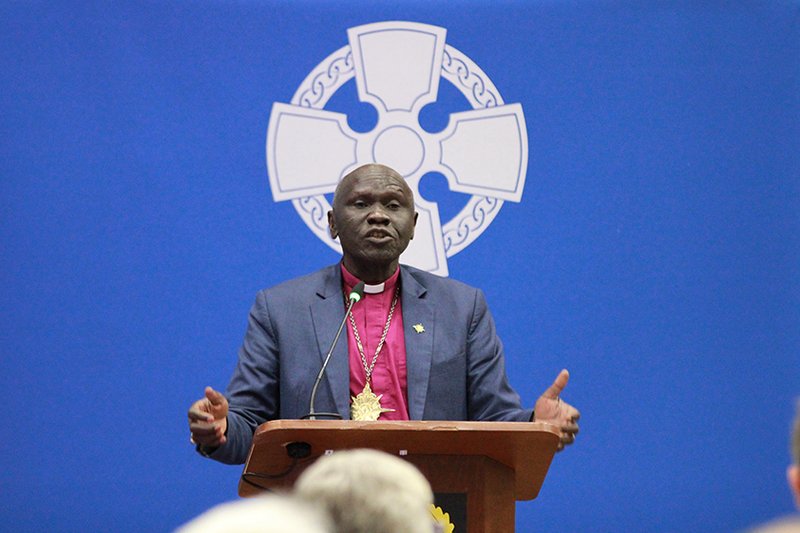
Bishop Gregory introduced Bishop Anthony Poggo, the secretary general of the Anglican Communion. He was born in Sudan but had to flee as a refugee aged only one, and could not return until he was nine, Bishop Cameron said. The son of an Anglican priest, he was educated both in Juba, in South Sudan, and also in Oxford. Initially working for Scripture Union, he was later ordained priest in Sudan. In 2007 he was elected bishop in South Sudan, a country wracked by war and internal strife but one where the Church holds a hugely important role in holding communities together. In 2017 he became the Archbishop of Canterbury’s advisor on Anglican Communion affairs at Lambeth Palace, and in 2022 he became secretary general of the Communion.
The Church in Wales is a valued member of the Anglican Communion,
Bishop Anthony began his speech by thanking the Church for the opportunity to fellowship with members at the GB. “The Church in Wales is a valued member of the Anglican Communion,” he said. He praised the contribution many Welsh Anglicans played across Communion affairs, from the Archbishop of Wales at Primates’ Meetings to the Bishop of Llandaff at the Anglican Consultative Council (ACC), to lay members who are members of various networks and initiatives. The Church in Wales should be proud of its work on gender justice, the environment, and safeguarding, and in particular for being the first province to have more female bishops than male.
The Anglican Communion Office (ACO) was not the headquarters of the Communion, but a secretariat – and independent from Lambeth Palace also, he reminded members: serving the 42 provinces in 165 countries. “We see ourselves as an enabling team here to serve and strengthen communion life. Our role is about connecting Anglican churches around the world, in global mission and fellowship.”
Building interfaith and ecumenical relationships and listening to all in the Communion was a central part of his role. During visits to member Churches, Bishop Anthony said he sought to listen and learn, and share what he had learned from other provinces. He had now visited 21 provinces of the Communion, and four more visits were planned before the end of 2024. Often his trips were acts of solidarity, especially to Anglicans facing huge challenges in places such as Sudan (where the primate has been forced into exile by the civil war), Myanmar and Jerusalem.
These visits were a striking reminder that “we are one family”, Bishop Anthony said. The ACO also supported the Four Instruments of the Communion: the ACC, the Primates’ Meeting, the Lambeth Conference and the Archbishop of Canterbury. The next major project being prepared was the next ACC in 2026, due to be hosted in Ireland. And above all, the Five Marks of Mission continued to be their guiding star.
The ACO also tried to engage Anglican priorities in global conversations, such as the science and faith networks discussed earlier at the GB, and at the United Nations where an Anglican representative raised the views of the Communion and highlighted the plight of the persecuted Church. There was also ecumenical work, Bishop Anthony said, noting in particular a January summit of Anglican and Catholic bishops. Resources on everything from mission and safe church to the environment and human dignity were also produced and shared by the ACO.
“Our Anglican Communion consists of many fellowships, yet we are still one family. Our focus is on relationships, which hold us together as a Communion,” he said.
Bishop Anthony shared stories of growth and hope to encourage the GB members. In Kenya, the Anglican Church had grown tremendously. When he studied theology in Nairobi in the early 1990s, the Church was dwindling in numbers as many young Christians left to join newer Pentecostal denominations. He recalled boarding a bus in 1992 and one of the conductors joking he could come in because “my bus is as empty as an Anglican church”. Thirty years later everything had changed – in fact the cathedral in Nairobi hosted 15 services every Sunday.
“I want to encourage us in thinking of innovative ways of doing church, rather than just ‘This is how we have always done it’,” he said. Consider church planting, he said, praising the HTB model in England which has helped revive dormant congregations.
Among the priorities of the ACO were peace-building, advocating for Anglican churches struggling with conflict, such as the Church of Jerusalem which is calling for a ceasefire in Gaza. Unity was another theme, Bishop Anthony explained, explaining that a working group was set up in 2023 to explore “theological questions regarding structure and decision-making in the Anglican Communion”, including Welsh representatives. Finally, prayer was central to the ACO – every year the cycle came round in praying for each of the 42 provinces.
The ACO’s work was funded by provincial contributions, which were declining as many struggled financially. Bishop Anthony thanked the Church in Wales for its support.
In closing, he said he was “overwhelmed by stories of hope as I travel the Communion”. In areas of great suffering, Anglican Churches were “stepping in to be the hands and feet of Christ”, and he thanked members for their own faithful service to the Lord in their context. “Let us continue to walk together in the mission of Christ. There is so much more that unites us than divides us within our beloved Communion family.”
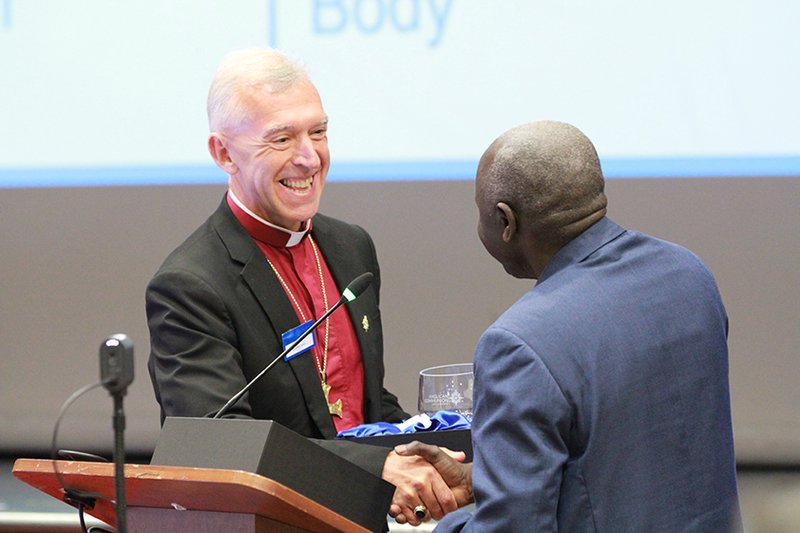
Bishop Anthony then presented an engraved glass to Archbishop Andrew, as a reminder that the family of God was fragile and needed to be “handled with care and prayer”. It was engraved with the Compass Rose symbol of the Anglican Communion, to point to the global need for mission and unity. In return, Archbishop John presented gifts to Bishop Anthony, thanking him for “the exceptional way you include all the parts of the Anglican Communion”.
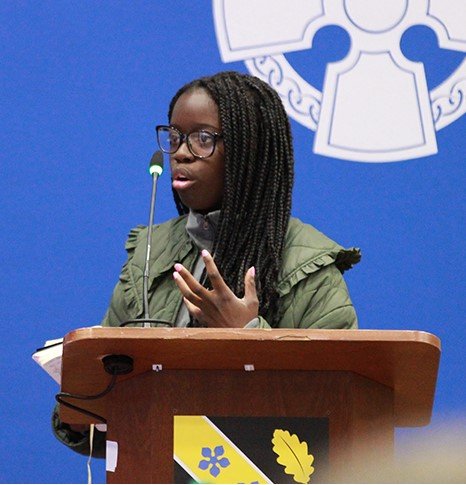
Grace Okutubo, pictured right, (Llandaff) asked how new, innovative ways of doing church could be married with ancient traditions.
The Revd Mark Thomas (Swansea and Brecon) asked if Bishop Poggo could share which are the poorest and most challenged provinces in the Communion and how we could be praying for them.
The Dean of St Davids, Sarah Rowland Jones, pictured below, said she been involved in the life of the Communion through sitting on its commissions since she was first deaconed decades ago. “It has enriched my life in innumerable ways,” she reported. The Church in Wales often lived under the shadow of its larger English neighbour, so it was encouraging to connect with other Anglican provinces much more alike to them. She urged members to get stuck into Communion activity.
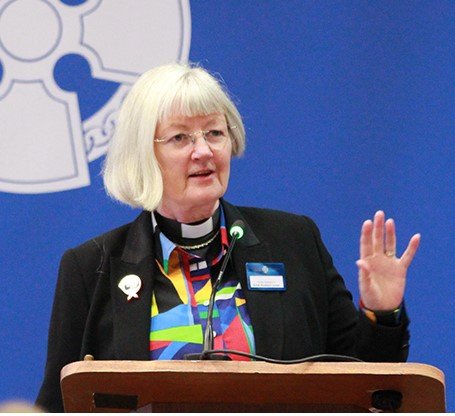
Responding, Bishop Anthony said context was all. “Don’t close your mind and say ‘This is how we have always done church and how we always will do church’, because you could miss out on reaching some important parts of God’s family.” British people seemed to live by the 11th Commandment: “Mind your own business.” But in his culture, there was space for ministers to challenge and call people to the way of Christ directly, he said.
There were many provinces struggling, Bishop Poggo said. He recalled once challenging a primate why they had not paid their contributions to the ACO, only to be told the money was needed instead to repair the provincial office’s leaking roof. But many of those churches struggling financially would be spiritually rich, which was why exchange between provinces was so valuable.
To close the session, Bishop Cameron led the GB in praying for Bishop Poggo and the Anglican Communion.
Public Protection sentences Bill
The Archbishop introduced an extra item relating to Imprisonment for Public Protection (IPP) sentences, following a recent Private Members’ Bill in the House of Lords. He invited Judge Nicholas Cooke KC to explain further. If passed, the bill would lead to the resentencing of about 2,750 people presently in custody and on licence under the IPP, he said. IPP sentences were indefinite and had led to some prisoners spending lengthy, “torturous” periods of time incarcerated or on licence, Judge Cooke said.
“We have to persuade the government to adopt this private members’ bill and then use government time to push it through.”
Archbishop Andrew said he would, with the GB’s approval, write to the Government expressing the Church’s support for resentencing. Members voted in favour of that approach.
Discussion on Governing Body meetings
Opening the debate, the chair Bishop Gregory, said it was important Governing Body was “effective” in its life and engaging. Members must feel they were making a difference to the Church in Wales and “our witness to the Kingdom of God”. GB meetings, however, were not cheap and represent a “five-figure investment” each time. This session was needed to “harness your wisdom” in future GB meetings, Bishop Cameron said.
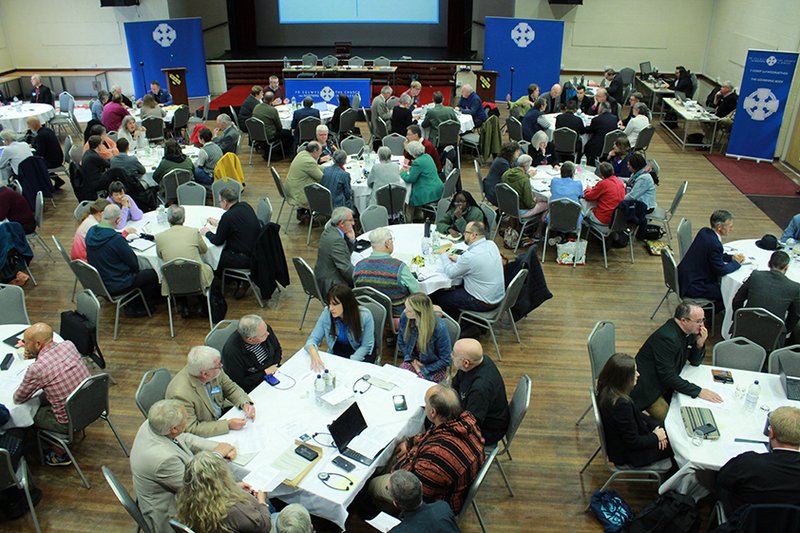
Members broke into small groups to discuss what worked well with current GB procedures and meetings, and what could be improved or changed.
After this discussion time, several members fed back what conversations had taken place on their tables.
The Revd Richard Mulcahy (Monmouth) said his group had praised the respect shown between members on the GB. It would be good for more public affairs issues to be brought to the GB floor in a timely fashion. He also questioned if the GB was the best way to disseminate information from the provincial level to parishes. There could also be more discussion on church growth, beyond the Fund.
Caroline Woollard (Monmouth) disagreed with Mr Mulcahy, saying that dissemination via GB members was vital. They praised the interaction between members, visiting speakers and the bishops, and said the agenda was well designed to cover different topics.
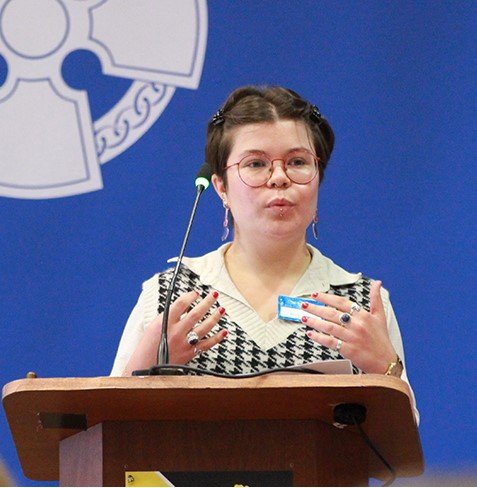
Melody Lewis (St Asaph), pictured, said her table thought it could be useful to have a dedicated youth slot at the GB, as it could be intimidating for younger people to come and take the microphone during general discussions.
The Dean of St Asaph, Nigel Williams, said his table would like more discussion of evangelism and growth in areas of social deprivation.
The Archdeacon of Carmarthen, Matthew Hill, praised the informal networking and discussion outside formal sessions of the GB, as well as the flexibility and responsiveness to questions during the meeting.
More detailed written feedback from each group would be collated and reflected on, Bishop Cameron said in closing.
Farewells
The Archbishop paid tribute to Tudur Jones, who was retiring as the Welsh translator having served at every Governing Body meeting for the past 20 years. “We regard him very much as one of us,” he said, thanking him for his dedication and professionalism.
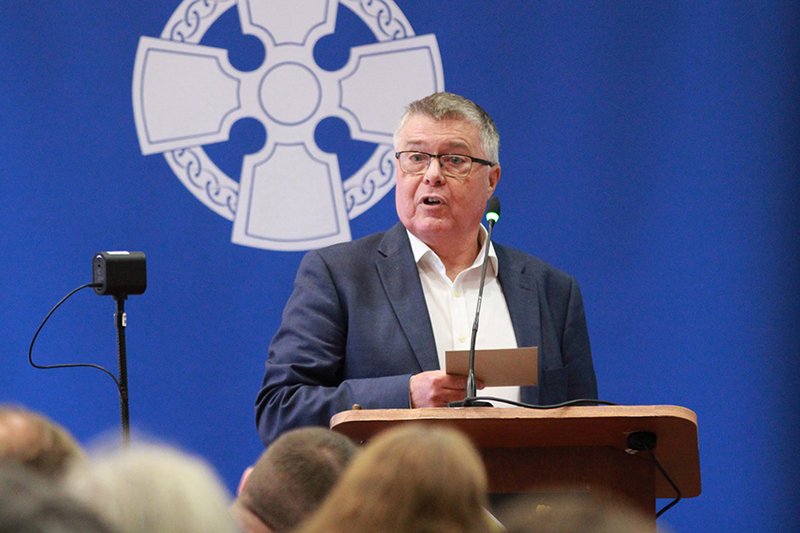
Mr Jones replied, saying, of all the organisations he had worked with over the years the Church in Wales had made him feel the most at home. “That means a lot to me. I will treasure the memories, and I wish you well.”
Next meeting
The next meeting of the Governing Body will be held on Wednesday 30 April and Thursday 1 May 2025 at Venue Cymru, Llandudno.